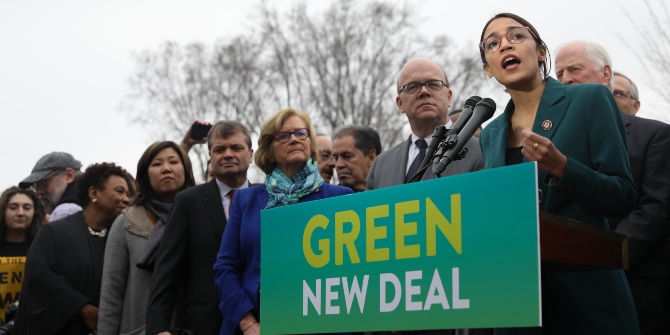
 In the aftermath of climactic disasters, questions can often be raised that scrutinize the response from government authorities in aiding those affected. Taken from their research presented in Public Administration Review, Wendy D Chen and Ilia Murtazashvili explore the role of blockchains in disaster management. While initially invented to serve as the foundation for cryptocurrencies, the authors argue that blockchains provide mechanisms of transparency and security that can enable governments to respond more effectively to disasters. Although not a perfect fix for all of the criticism that can arise from inadequate disaster management, blockchains could provide some tools in mitigating against ineffective government response.
In the aftermath of climactic disasters, questions can often be raised that scrutinize the response from government authorities in aiding those affected. Taken from their research presented in Public Administration Review, Wendy D Chen and Ilia Murtazashvili explore the role of blockchains in disaster management. While initially invented to serve as the foundation for cryptocurrencies, the authors argue that blockchains provide mechanisms of transparency and security that can enable governments to respond more effectively to disasters. Although not a perfect fix for all of the criticism that can arise from inadequate disaster management, blockchains could provide some tools in mitigating against ineffective government response.
Current inadequacies in disaster management
Catastrophic disasters like hurricanes, floods, and disease outbreaks are increasing in frequency and severity globally. According to a 2020 report from the UN Office for Disaster and Risk Reduction, over 7,000 major disaster events claimed 1.23 million lives and nearly $3 trillion in economic damage worldwide in just the two decades prior to the COVID-19 pandemic. Criticism of inadequate disaster management tends to focus on three key problem areas: inadequate transparency/communication, declining public trust, and social inequities.
Each challenge can be illustrated with the response to Hurricane Katrina, which wreaked havoc in the south-eastern United States in 2005. The response to Katrina was hampered by the inability of government authorities to convey risk information and preparation needs to the public and, after the disaster struck, communication breakdowns between government agencies. Various instances of corruption in the response to Katrina, from multiple levels of government, undermined public confidence in government, while past perceptions of corruption contributed to distrust in government that led people to downplay warnings, undermining prevention and preparedness. Katrina also demonstrated once again that minority communities are especially likely to suffer from natural disasters. In Katrina’s wake, for example, Black communities were less likely to evacuate and received fewer rebuilding trailers from the federal government than wealthier white neighbors.
What are blockchains? How can they help?
There are no magic bullets to address this challenge. Still, technologies offer some promise to address some of these gaps in disaster management. In a recent article in Public Administration Review, we consider how blockchains – distributed, append-only ledgers – offer promise for improving the ability of governments to respond effectively to crisis management. Our article, entitled “Blockchains for Emergency and Crisis Response,” focuses on the ways in which blockchains can address the challenges of communication/transparency, declining trust in governments responsible for responding to crises, and inequities in crisis response.
Blockchain technology has become famous as the foundation for cryptocurrencies like Bitcoin. Blockchains are novel ledgers in that they record transactions or other information in a way that is more transparent and immutable than previous ledgers. They allow open participation in verifying and sharing data that can’t later be manipulated. Put differently, there is no central authority governing blockchains. A distributed network of computers verifies and stores the records. All participants in the network can view transaction histories. Their cryptographic techniques authenticate transactions, and the digital signatures prevent tampering or hacking, which enhances openness and accountability. Once data points are validated and added to the chain, it can’t later be altered or deleted, which ensures data security.
While invented to enable cryptocurrencies like Bitcoin, blockchains have expanded into other domains given these features. We outline several ways blockchain could help disaster preparedness and response. First, blockchain technology can improve information sharing between government agencies and with the public as the blockchain deployments rely less on centralized agency or government information. Its ability to validate the accuracy of data such as clinical trials and vaccination records combats misinformation and allows the public to have a clearer understanding of the status of the crises. Additionally, blockchains’ tamper-proof ledgers help reduce corruption fraud and build public trust in public spending. As a matter of fact, blockchains’ secure digital identities and records can streamline distribution of emergency funds. Moreover, tracking of resource flows enabled by blockchain technology promotes more equitable allocation to vulnerable communities.
One of the themes of this emergent research on blockchains for crisis management is that transparency and security provided by blockchains offer a means to address recurrent issues around poor communication, distrust, and inequity that impede effective crisis management. Governments at various levels have explored the ways blockchains can be used to improve government interfaces with first responders, businesses that provide relief during crises, and ways to use blockchains to improve the efficiency in the process of providing benefits to people in the wake of crises. Hence, blockchains offer a vast potential. Given their deployments in business, opportunities for use in the public sector remain a fertile ground for further exploration. As we explain, many of these projects have not advanced far beyond initial pilot projects, and that technology alone cannot solve each of these problems, but thoughtful application could bolster societal resilience.
Cautioning against the limitations of blockchains
Realizing this potential isn’t without challenges. Public managers will need training to implement it successfully. Thoughtful policies and regulations around data access and privacy are required, especially regarding sensitive health information. More importantly, fuller digital inclusion is necessary for equitable impacts, since underserved groups currently have less technology access and literacy. There is also the important question of whether a blockchain-based solution justifies the cost of implementation compared to less sophisticated digital technologies for communication and coordination.
The challenges of crisis response have proven especially stubborn. Though blockchains are not yet widely deployed, their potential is a justification for greater analysis of the ways blockchains can be creatively deployed by governments to improve ability to respond to crises. It is also essential to understand why blockchains are not as widely deployed. Blockchains confront their own dilemma: technology can improve trust in government, but adoption of technology used by government requires trust. More research on overcoming this chicken-and-egg problem with technologies for good is an important area of research in public administration, and analysis of its relation to blockchain is just getting underway. More research by public administration scholars can clarify the pros, cons, and best practices of blockchain usage going forward. Done well, innovating governance for the digital age could pay dividends in saving lives and rebuilding communities when the next catastrophe strikes.
- This article is based on the paper, ‘Blockchains for emergency and crisis management’, in Public Administration Review.
- Featured image credit: Photo by Kelly Sikkema on Unsplash
- Please read our comments policy before commenting.
- Note: This article gives the views of the author, and not the position of USAPP – American Politics and Policy, nor the London School of Economics.
- Shortened URL for this post: https://bit.ly/47IYpph






